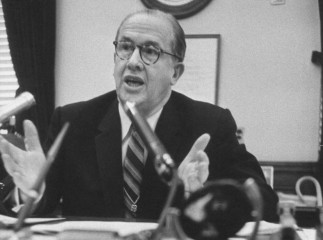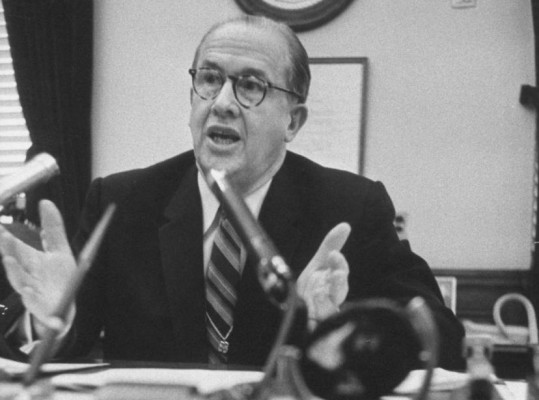Mormon Chronicle Note: Whether or not you agree with any personal conclusions made by Michael Quinn, his essay “Ezra Taft Benson and Mormon Political Conflicts” is the most in-depth treatise on the topic and contains a lot of interesting information.
The Mormon Chronicle disagrees with many of the conclusions and assumptions presented by Quinn in this essay. We hold Ezra Taft Benson in the highest regard. We share this essay in hopes that the reader will get some insights into the conflict that did exist and also that you can discern the truth for yourselves. As with much of Quinn’s research a truth seeker will have to discard many of his personal opinions and gain insights from the source material his essay is based on.
From D. Michael Quinn:
 From the 1950s to the 1980s Ezra Taft Benson was at the center of a series of political conflicts within the Church of Jesus Christ of Latter-day Saints. In 1943 he became a member of the Quorum of the Twelve Apostles. With church president David O. McKay’s permission, he served as Secretary of Agriculture to U.S. president Dwight D. Eisenhower from 1953 to 1961. Benson’s autobiography and official biography openly present the national controversies involved with his service as Secretary of Agriculture.
From the 1950s to the 1980s Ezra Taft Benson was at the center of a series of political conflicts within the Church of Jesus Christ of Latter-day Saints. In 1943 he became a member of the Quorum of the Twelve Apostles. With church president David O. McKay’s permission, he served as Secretary of Agriculture to U.S. president Dwight D. Eisenhower from 1953 to 1961. Benson’s autobiography and official biography openly present the national controversies involved with his service as Secretary of Agriculture.
Less known is the quiet conflict between Secretary Benson and politically conservative LDS administrators and general authorities in Utah. As early as 1953, First Presidency counselor J. Reuben Clark said he was “apprehensive of Bro Benson in Washington.” By 1957 Clark and Apostle Mark E. Petersen agreed to instruct the church’s Deseret News to “print the adverse comment” about Benson’s service as Secretary of Agriculture. The next year several general authorities and church administrators expressed personal opposition to Benson. In March 1958, Apostle Harold B. Lee said that Benson needed “humbling” to serve “properly … as a member of the Council of the Twelve.” In July Ernest L. Wilkinson, Brigham Young University’s president, wrote that Benson “espouse[s] certain principles which are utterly inconsistent with the feeling of the Brethren.” During the next several months Apostle Hugh B. Brown actively (and successfully) campaigned for the Democratic candidate in Utah’s U.S. senatorial race, and against Benson’s support of the incumbent Republican.
Criticism of Secretary Benson even included the First Presidency. In 1958, Counselor Clark said, “I did not think the Secretary of Agriculture would yield to argument,” in conversation with the chair of the Utah Cattlemen’s Association and the chair of the National Wool Growers Association. By 1960 Clark complained that “Sec’y Benson’s policies have about extinguished the small farmer and small cattleman.” Clark’s view was shared by the other counselor in the First Presidency, Henry D. Moyle. And in 1961 Wilkinson observed that “President McKay for the moment is displeased with some things that Brother Benson has done.” However, it is unclear whether Benson even knew that his fellow general authorities disapproved of his policies as Secretary of Agriculture. For example, J. Reuben Clark concealed his disapproval in public statements about Benson. In conversations and correspondence with Benson, he also muted his dissent.
On the other hand, almost as soon as Ezra Taf t Benson returned to Utah from Washington, D.C., in 1961, he became involved in a well-known conflict with senior members of the Mormon hierarchy. His official biographer declined to write about this controversy, and that silence is equally true in the biographies of every other general authority who was prominently involved. Despite this conflict’s significance for modern Mormonism and the national publicity it received, this story is either absent or muted in histories of the LDS church. Because these matters are significant to the internal dynamics of the operations of the LDS hierarchy, this essay examines at length Apostle Ezra Taft Benson’s conflicts with other general authorities which began in the 1960s. . . .
Download the 87-page PDF document “Ezra Taft Benson and Mormon Political Conflicts” by D Michael Quinn.


Please be better about checking the facts on the people whose work you use to publish on this website and through you Facebook. It is well known among the least of us “researchers” that D. Michael Quinn is, what I call, a “soft anti-mormon”, and that he fills his writings with false claims. I do not trust one word that mans says/writes. Please read this article about his work on Homosexuality in the LDS church by the Neal A. Maxwell Institute. It gives you a good idea of how much to NOT trust a word from Quinn.
http://maxwellinstitute.byu.edu/publications/review/?vol=10&num=1&id=280
Thank you,
Teri
The Mormon Chronicle disagrees with many of the conclusions and assumptions presented by Quinn in this essay. We hold Ezra Taft Benson in the highest regard. We share this essay in hopes that the reader will get some insights into the conflict that did exist and also that you can discern the truth for yourselves. As with much of Quinn’s research a truth seeker will have to discard many of his personal opinions and gain insights from the source material his essay is based on.
What a long read. Sadly I didn’t find it very insightful or educational. The author’s motivations are so slanted that I found it nearly impossible to develop an accurate perspective of these events. For one thing the author almost never quotes anything with enough context to understand what is actually being expressed. Instead he leaves the reader completely reliant on his own commentary which I found to be completely perjured in contrast to my own research, experience and knowledge.
On the other hand, I’m not so fanatical or rigid in my beliefs to deny that some or much of what was portrayed might be accurate. I would like to know more about the subject.
However, I perceive this authors intention to be more sinister than mere bias. Rather than a thesis of someone sincerely convinced crusading to advocate their own position, I sense a motive to sow sentiments of doubt, confusion, and disbelief in the divine organization and authority of the church and it’s leaders, regardless of the reader’s leanings on the political issues addressed.
Right. It would be nice if someone spent the time to create an extensive essay on this topic in a more contextually accurate manner. I find it to be an interesting topic to read about.
I read the essay and found it very interesting because I lived thru the entire period. The essay filled in many of the details I did not know. This is howerver, a very biased essay is someone does not have an overview of the truth of what was going on in the Church at the time. Such as Pres. McKay attended Cleon Skousen’s lectures on communism and asked him with help from BYU to write the Naked Communist. The conclussions at the end of the essay are wrong.
There is another very good treatment of this period in Gregory A. Prince’s David O. McKay and the Rise of Modern Mormonism. Prince does a good job of showing the balance and the struggle President McKay had with this conflict due to his own very strong anti-Communist position.
President Benson was not incapacitated especially during the first part of his time as Prophet. I understant one of his family asked him one day why he did not speak on politics and government as he had fomerly spoke. His words were to the effect “that if he continued to speak as before it would be to the Church Members further Condemnation.” That is the sad reality that the Book of Morman warnings have not been headed by the members and leaders alike.
When Benson went to Europe as Mission President did he go there to get silenced politically and did Joseph Fielding Smith write to some Idaho congressman hoping he would be purified of politics? Thing is I read were JFS never badmouthed or allowed others to badmouth fellow Quorum members in his presence. Mark E Peterson was in Europe too. Something Benson haters criticize
IMO, the Mormon Church officially ended with the death of ETB. In the Church of today we get this garbage; http://mormonsandgays.org/ (church claims homosexuality is genetic).— and this garbage; http://www.heraldextra.com/news/state-and-regional/uchtdorf-supports-obama-s-immigration-blueprint/article_3a27246d-ac01-5256-93dd-91c11ce761ee.html
Benson shut up on political matters once he was church President because he knew he was wrong. He was a bigot and a hateful man. A man who would have been a dictator if he were in charge at a younger age.
His racial bigotry has harmed the LDS church.
Thanks for your biased, insight-less, and completely fact-free anonymous comment! Next time, please bring honest discussion points with you to class.
I am not an LDS member, although I studied the documents (Pearl of Great Price, Book of Mormon, etc) and visited Joseph Smith’s house and the ”sacred grove.” That said, I often tell friends and family that Ezra Taft Benson is my political hero. I’ve read his books and speeches and they are as informative and inspirational today as they were 50+ years ago. His patriotism and understanding of the Constitution are out of fashion in this politically correct society of ours. I’m glad to see some people are still highlighting his life and world view.